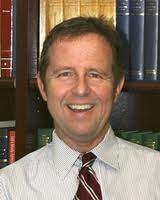Friends You Should Meet (6) — Michael Horton


It’s no secret that I love books. Here in my study I often feel like I’m surrounded by good friends. In this series of posts, I’d like to introduce you to some of my friends, both the old ones from centuries ago and the more recent ones. I’ll describe their strengths and, where necessary, their weaknesses. The aim is to help you find good friends for yourself — in other words, to find edifying reading that will give you a better understanding of the Christian faith, a greater grasp of the gospel, and a deeper love for Christ.
Most of the authors I’ve been introducing I first became acquainted with as an undergrad. Michael Horton came into my life comparatively late — as a seminary student in my last year. I knew nothing about him, but his book Made in America: The Shaping of Modern American Evangelicalism grabbed my attention. It was a compelling expose of the foundations of much of what passes for Christianity on our continent. A short while after that I was driving around Edmonton and accidentally came across someone talking about Reformed theology on the radio. It was the White Horse Inn, hosted by Michael Horton and three other “gents.”
Michael Horton received his seminary training from Westminster Seminary California (WSC). He went on to receive a Ph.D. from Oxford. Since 1998, he’s been a professor of theology and apologetics at WSC. He is an ordained minister of the United Reformed Churches and his credentials are held by Christ United Reformed Church in Santee, California. He’s the editor-in-chief of Modern Reformation magazine and, as mentioned, host of the nationally syndicated White Horse Inn radio broadcast. He’s authored numerous books and articles and regularly speaks at conferences in the United States and around the world.
Why is Michael Horton important? First of all, he grew up in a world distant from the Reformation. In later years, he discovered Reformation theology and became convicted of its biblical richness. Not all is well within Reformed churches, but Horton’s contribution is to point out that, rather than looking to what used to be called “evangelicalism,” we should look deeper into our own heritage. Because it is so oriented to the Bible, our confessional heritage has the resources for necessary ongoing reformation. Second, Horton writes two kinds of books: scholarly and popular. If you’re familiar with the scholarly stuff, you know that it’s the foundation for the popular. In both types of writings, he takes the Bible seriously and understands and emphasizes the centrality of the gospel of grace in Jesus Christ.
Where do I start? I’ve read at least ten books by Michael Horton. My favourite is A Place for Weakness: Preparing Yourself for Suffering (previously published as Too Good to be True: Finding Hope in a World of Hype). I’ve given away numerous copies of this little book because of its realistic, biblical treatment of suffering. Another Horton must-read is Christless Christianity: the Alternative Gospel of the American Church. This is a jeremiad, lamenting and exposing the shallowness and emptiness of North American Christianity. It has a bearing on many of our Reformed churches too. We’re in no less danger of falling into a form of “Christless Christianity.” The third one that I’ll recommend here is A Better Way: Rediscovering the Drama of Christ-Centered Worship. In this one, Horton again exposes the problems with what passes for worship these days, but also outlines the biblical beauty of Reformed liturgy. Finally, there’s the classic Putting Amazing Back into Grace: Embracing the Heart of the Gospel. This is an excellent exposition of the doctrines of grace.
What to look out for? There are three things that readers should know about Horton. These things come up occasionally in his writings and on his radio program, lectures, etc. The first is that he follows Meredith Kline’s reading of Genesis 1-2. In other words, he holds to the Framework Hypothesis. However, he is not a theistic evolutionist (the URCNA allows for the Framework interpretation, but not for theistic evolution). Second, his view of covenant theology may be unfamiliar and uncomfortable to some readers. In his book God of Promise: Introducing Covenant Theology, he again follows Meredith Kline. Like many Reformed people past and present, he holds to three biblical covenants: redemption, works, and grace. Though some might disagree with this covenant theology, it does fall within the parameters of the Three Forms of Unity. Moreover, it is arguably the classic Reformed view in many respects. Finally, as a matter of emphasis, in his ecclesiology (doctrine of the church), there is not a strong accent on the confessional categories of true and false. I especially noted this in his book People and Place: A Covenant Ecclesiology.
Over the years, reading and listening to Michael Horton has been a great blessing for me and my ministry. Through him I became even more convinced that Christ and the gospel have to stand central in everything we do as church. Let me finish with a characteristic Horton quote: “A church that is deeply aware of its misery and nakedness before a holy God will cling tenaciously to an all-sufficient Savior, while one that is self-confdent and relatively unaware of its inherent sinfulness will reach for religion and morality whenever it seems convenient.” (Christless Christianity, 243).


